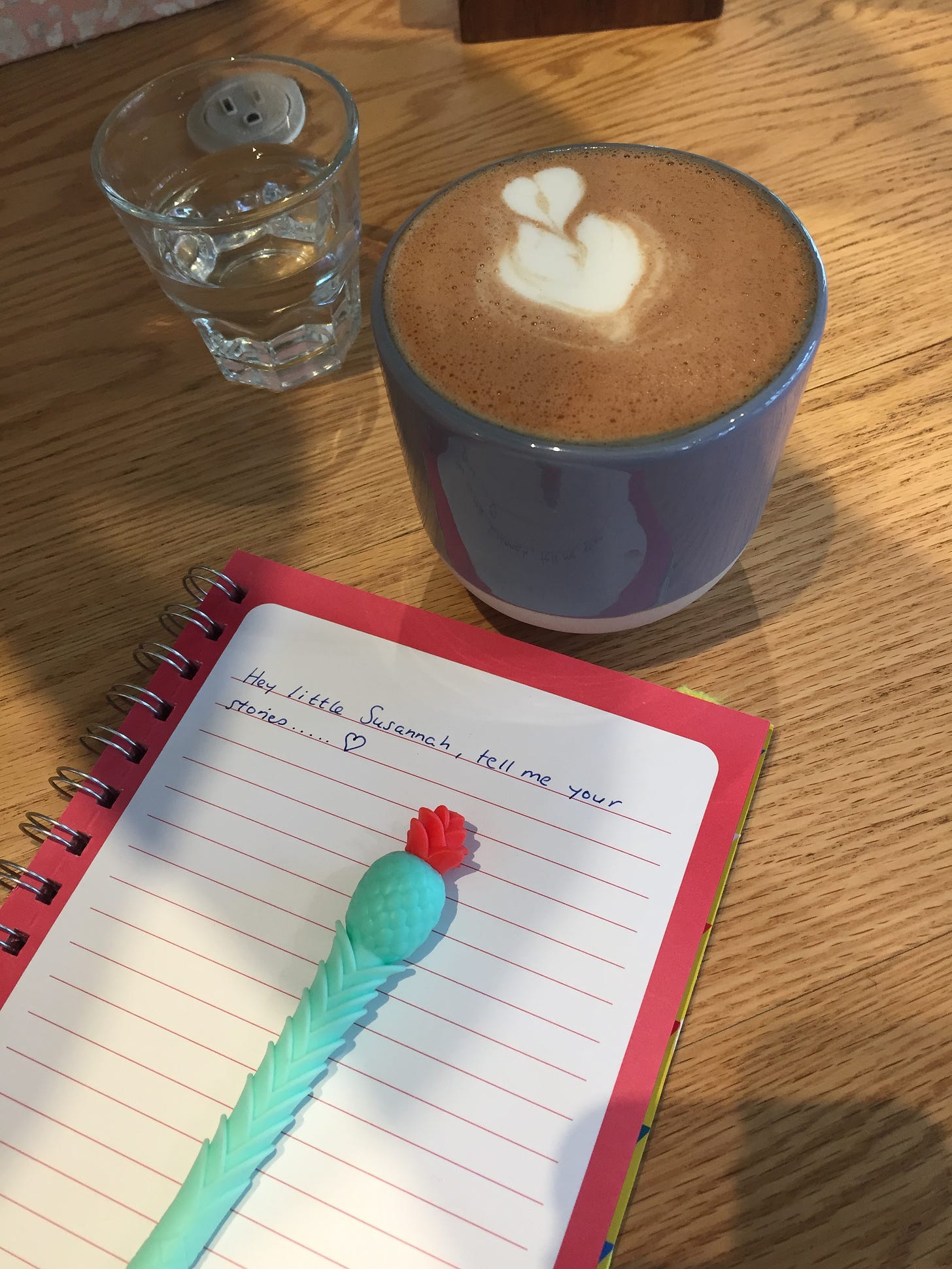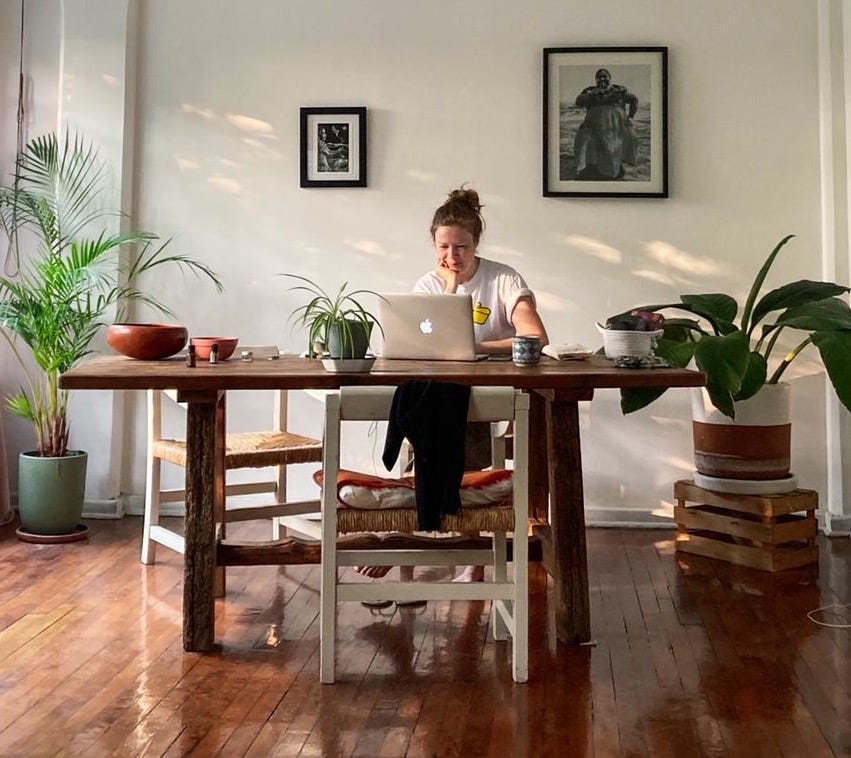Writing this newsletter is an act of love and joy. I am committed to delving into the beautiful, the messy and the sublime that is this act of creating through words. Ultimately, my goal is to remind you that you are Write As You Are.
If you find this newsletter helpful or heartwarming, you can support me by:
Sharing it with someone else who might enjoy it
Liking and commenting (I really love hearing from you!)
Checking out my mentoring offerings 💜 I’d love to work with you.
Here are a few things that I have come to know about writing after many years as a writer and writing mentor. I will say that in pretty much all of these cases, ‘writing’ can be switched out for any creative pursuit.
1) Writing loves a container
We have a romantic idea often, that writing should just flow as and when we are inspired. However, I think that writing actually flows best when it has a container. I make a comparison between writing and children (bear with me). When a child knows their parameters, they feels safe to flow/to be in the moment. “You have fifteen minutes to play and I will set a timer”- watch that child fully play and be in the moment right until that timer buzzes. It’s the same with writing- when writing knows the parameters it flows more easily. So having regular times that you write or giving yourself word count goals can allow for creative flow rather than restricting it.
2) Writing expands like a sponge
I’ve watched this happen more times than I can count with my clients. They come to me unable to find time to write and so we start small. One or two writing sessions a week, 20 minutes a pop. Then writing gently demands more, through the guise of inspiration, excitement, desire to write. The writer goes from struggling to write to being frustrated they don’t have more time, and then reprioritising things in their life to find extra space for writing.

3) We are actually truly better creatively when we take care of ourselves
I’m with Liz Gilbert that all the romanticism around the tortured artists is dangerous bullsh*t. I am categorically a much better writer when I am nourished and taking care of myself; emotionally, physically and spiritually. It takes a lot to write a book, I don’t need to torture myself too, on the contrary, I am allowed to find it the most pure joy!
4) Creativity is very childlike
As mentioned earlier, the essence of creativity is childlike. Did you write books as a child? Do you remember how you needed no reason to write it other than just to write it? Do you remember you wrote it in a cool notebook, with a fun purple pen? I often suggest that my clients take themselves to a toy shop/stationary shop and pick out the thing their little one inside would like. One writer friend I suggested this to came back with a pet rock and loads of sweets. That pet rock now sits on her desk and reminds her of that part of herself. My desk is full of things that delight my inner child- which makes me want to sit there even more.
5) When I am not writing I am making up stories and they are usually bad
Writers are great storytellers and when we aren’t writing we continue to make up stories and they are often bad news stories. Be aware that if you don’t offer yourself a creative outlet for a while that inner storyteller might start causing trouble. Even if you need a break from a big project, maybe give yourself fun writing tasks to keep that creative elf busy.
6) Writing is the best way to improve as a writer
Annoying but true! I don’t think you get to craft book your way to evolving as a writer (although they can definitely be a great support). I think it is through writing and editing and writing and editing and trying and failing that we evolve as writers.
7) Writing responds to devotion
My writing is a devotional practice not one of dedication. Can you feel the difference?
8) Reading is among the best gifts we can give our writing
There ain’t many better gifts to your writing self than reading and reading a lot.

9) Having writer friends is so important
This thing we do takes a lot of time and sacrifice and can seem crazy to some people who don’t do it. Having writer friends who get it is a game changer. I speak every week to one writer friend for an hour and we pull each other through the hard times and remind each other to celebrate the wins. It’s one of the most important and delightful hours of my week and has pulled me back from sacking it all in more than once.
10) The more you notice the better your writing, the more you write the better you notice
I’m aways talking to new writers about the importance of observation. Really look at what’s around you, take in the colours, take in the sounds, the smells, listen to how people talk, watch how people move. The more you notice the more alive your writing becomes and, in turn, the more alive you feel.
11) The fallow moments are usually deeply fertile times
Trust the fallow moments. We can’t be continuously producing, we’re not robots. Fallow moments are moments of replenishment, moments when the subconscious is at work. Let yourself be in the dark, fertile soil for a while, knowing that new shoots take time to appear.
What resonates with you? And what do you know to be true about writing? I would love to hear.
Mentoring
Have you got that back to school feeling? Have you bought a brand new notebook and a fresh set of pens? Would you like some support in really kickstarting this final quarter of the year, getting a project moving or getting it to completion? I would love to support you.
This September I have opened up an extra spot, so I currently have two spaces available for my four-session packages. Does one of them have your name on?
Recommendations
A few things I have enjoyed recently…
Brilliant Newsletter: You may well have newsletters coming out of your eyeballs but It’ll Be Fun, They Said by
, centred around the life of an American woman working in a bookshop in the UK, is so brilliant that you’ll be happy when it arrives in your inbox. I always brew a cuppa and sit down to enjoy the exquisite writing and brutal honesty.Book: Even as I write this, I am not sure I recommend this book or not. It’s On Chesil Beach by Ian McEwan (fun fact, I went to a party at McEwan’s house when I was very little, he had a lovely garden). I quite disliked this book, finding it rather cold and unemotional until the end and then it moved me in such a way that I forgave it everything. Have any books ever done that to you?
On Books in Drawers: This newsletter from Mslexia was a good reminder that no work is ever in vain or truly lost.
Thank you for being here. It’s a joy to share this writerly journey with you!




Love this, Susannah, and agree with all your points… except children and parameters. I found if I gave mine time to play or watch tv, they would waste the whole time challenging the amount of time I’d given them and then whinge because time was up. Aren’t everyone’s kids like that? Just mine then …
I wish I'd realised that writing loves a container earlier! It's so true though. Also love Jess Pan ❤️